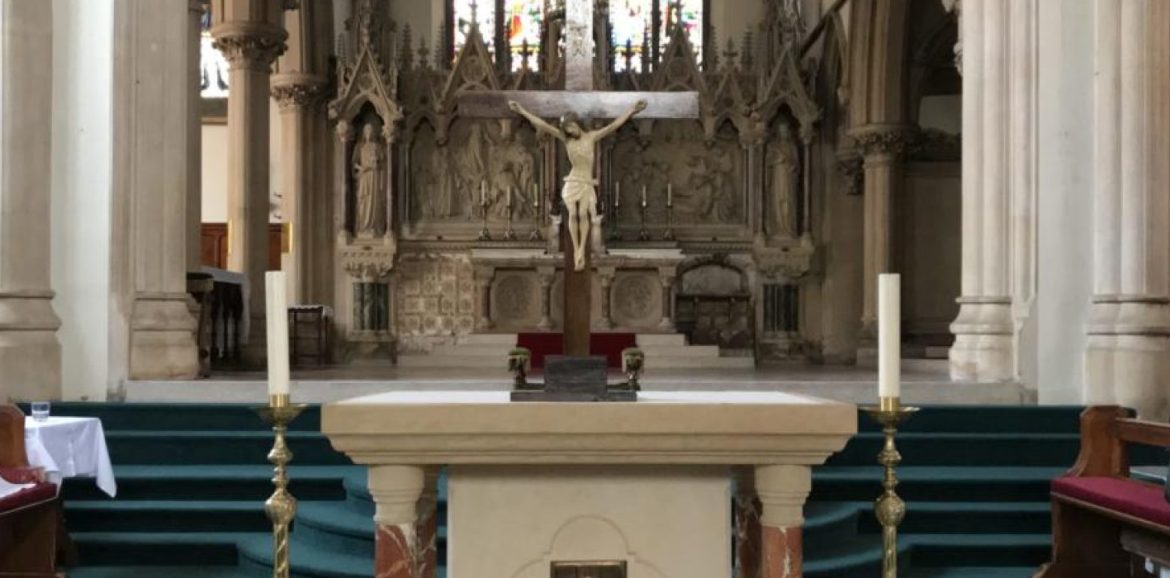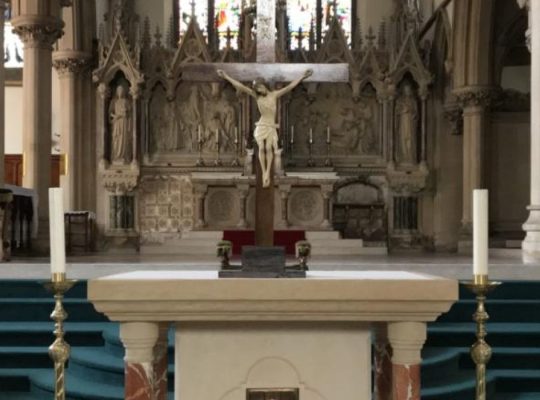Today we celebrate Laetare Sunday, and the colour of the vestment for Mass is rose, a lighter version of the violet that we have been wearing because, today the penitential violet is mixed with the white of the approaching festival. We also celebrate today, Mothering Sunday, a day when Mothers are treated in a special way, by their children.
It is part of human nature that we cannot go on being penitent for a long time, or we sink into a settled and insincere gloom rather than working at the definite and active spiritual exercise called penance. The Church knows human nature, and both in Advent and Lent there is a moment where the atmosphere of penance and preparation is brightened by a shaft of light from the glorious season we are preparing ourselves for.
The Third Sunday of Advent tells us ‘Gaudete’ ‘Rejoice’ because the Lord is near; and the Fourth Sunday of Lent says ‘Laetare Ierusalem’ ‘Be joyful Jerusalem, and all who love her!’ Because she herself is loved by the Lord. On Gaudete and Laetare Sunday’s, therefore, the dark penitential violet may be lightened to what the documents call ‘Rose’ but most laymen would call ‘pink’. It is also recognized that the vigours of Lent may be slightly relaxed.
Our first reading today tells how Holy God cannot tolerate sin; he abhors it. He becomes indignant when he sees it committed, especially by those who have freely entered a covenant with him and whom he has surrounded with his kind protective love. But he holds back his anger. Always ready to forgive at the first sign of repentance, he does not abandon those who turn away from him. On the contrary, without waiting or becoming weary, and never hesitating to take the first step, he sends them messengers to beg them to return. This has been so since the beginning, since the fall, when original sin entered the world: the whole of sacred history attests to this faithfulness of God, of which certain striking events are exemplary illustrations. The exile into Babylon is among these, as well as the manner in which the trial ended. Therefore, it is not surprising that the authors of Chronicles evokes these facts in concluding their theological meditation on the checkered history of the faithfulness of Israel, to whom God never ceases to manifest his mercy.
These events are part of sacred history; therefore, we cannot show a lack of attention to them. Nevertheless, the truth is that today’s readers are less interested in the material facts than in their religious significance. Biblical authors such as the authors of Chronicles already strove to disclose the theological interpretation of the reported facts. Thus, they opened the way to a reading of past events rich in teaching applicable to the present. This is why the Church still recalls the mercy of God, who has unceasingly renewed covenants with human beings, teaching them through the prophets ‘to hope for salvation.’
There is a logical connection between sin and punishment for sin. Who, indeed, would God be if he were to remain indifferent to the abominations committed against the commandments he has decreed, the charter of justice and liberty? What is to be said about a covenant that God would see broken without reacting? Crime, sacrilegious practices, profanations committed with impunity scandalize us. However, there is a problem. On the one hand, who can unquestionably declare that such and such a misfortune is a punishment for sin? Jesus, one day, reacted against this simplistic interpretation devoid of any nuance. The disciples were asking, ‘Who sinned, this man or his parents, that he was born blind?’ Jesus answered, ‘Neither he nor his parents sinned; it is so that the works of God might be made visible through him.’ We must therefore guard against hasty judgements, especially in particular cases.
The authors of Chronicles are certainly convinced that the Exile and the ruin of the Temple were God’s punishments. But they refer to the preaching of the Prophets—Jeremiah and Ezekiel in particular—whom God, without waiting or becoming weary, sent to his people to warn them, but they persecuted them.
The authors also point out that the Exile and destruction of the Temple had no value or justification in themselves. Happening when ‘the anger of the Lord against his people was so inflamed that there was no remedy,’ the punishment, like the exhortations of the Lord’s messengers, had for its goal the conversion and forgiveness of those who had done evil. As we speak of a punishment imposed by God, the expected result was not uncertain. A king—Nebuchadnezzar—was the instrument of God’s punishment. Another king— Cyrus— was the instrument of salvation. It is the Lord, the authors say, who inspired Cyrus to put an end to the Exile. The king of Persia even acknowledged, in his edict, that God had ‘Charged [him] to build him a house in Jerusalem.’
Although such a reading of history is foreign to us, and it is a delicate thing to do with discernment, nonetheless, this passage from Chronicles is no less stimulating today, especially during Lent. It quickens our faith and our hope in God, the Saviour. It motivates our trustful and constant prayer. This prayer joins, in particular, the entreaties of those who are bent under the weight of injustice and oppression, the consequence of sin, but we shall keep ourselves from saying—or thinking—that the sin deserved punishment.
We now turn to a conversation Jesus had with Nicodemus, in todays Gospel. Even outside its literary context—at the end of the conversation between Jesus and Nicodemus— the passage from John’s Gospel read on this Sunday is of great spiritual and theological importance. Besides, several of its elements concur with and complete what our first two readings say.
‘And just as Moses lifted up a serpent in the desert, so must the Son of Man be lifted up, so that everyone who believes in him may have eternal life.’ In John’s Gospel the lifting up of the Son of Man refers to Jesus on the cross. ‘So Jesus said [to them], ‘when you lift up the Son of Man, then you will realise that I AM, and that I do nothing on my own, but I say only what the Father taught me.’’ (Jn 8:28) The cross is thus seen as the supreme manifestation—epiphany—of the glory of Christ because it marks the hour of the Lord’s victory over evil, because at that moment the obedience of the Son, who receives the Spirit from his Father, shines forth.
The recalling of the bronze serpent raised up by Moses is meaningful. The Lord had sent venomous serpents to the Hebrews as a punishment for sin. Those who had been bitten by them would not die if they looked upon the serpent on the pole (Num 21:6-9). Thereafter, to have life, we must raise our eyes to the crucified one in order to obtain eternal life through him.
This ‘looking upon’ is part of John’s vocabulary of faith. And when he speaks of eternal life, it is an already present reality that he designates: ‘Whoever hears my word and believes in the one who sent me has eternal life and will not come to condemnation, but has passed from death to life’; ‘Whoever believes in the Son has eternal life’; ‘Whoever possesses the Son has life.’
‘God is love.’ He showed his love for us by sending his only Son into the world so that we might live through him. ‘God did not send his Son into the world to condemn the world, but that the world might be saved through him.’ We could not say more strongly and clearly that the intent of God, when sending his Son, is exclusively salvation; that, as a consequence, judgement and eventual condemnation do not precede from his initiative or action. These two propositions—affirmative, then negative—re-enforce each other to express the same truth. But then, how can we still speak of judgement? The mention of the bronze serpent helps us find the beginning of an answer. It was raised in order that those who looked upon it would recover. As a consequence, those who did not do this condemned themselves, in spite of the intervention of God and Moses, his servant. Likewise, Christ was given to the world by the Father and raised upon the cross. However, we have here only the beginning of the answer, an analogy.
Christ is the true light that came into the world in order to enlighten everyone and, by making them children of God, to confer salvation on those who receive him. But it is up to each person to receive him, to come into his light rather than remain in the darkness. No one can escape this personal choice. The coming of the Son of God into thew world, the decisive battle between light and darkness, obliges each one to take sides right now. In fact, John’s Gospel has the form of a suit against Jesus, one in which we must choose our side; it is impossible to remain neutral. Either we recognise Jesus’ light, truth, and life, and we welcome salvation, or we refuse Christ by preferring darkness, evil deeds, death: in this case we find ourselves—voluntarily—judged.
It is clear that God created human beings free and, by entrusting the universe to them, offered them life in his friendship. Misled by the enemy, they broke this covenant, as we might call it, to which they had been parties. But God for his part, ever faithful, did not go back on his word. He made the world so that all creatures might be filled with his blessings and might rejoice in his light. ‘Even when he disobeyed you and lost your friendship you did not abandon him to the power of death but helped all men to seek and find you. Again and again, you offered a covenant to man, and through the prophets taught him to hope for salvation.’
The mission of those sent by God consisted especially in warning people that by leaving the way traced by God, they were running headlong to their ruin. But they spurned those words and mocked the prophets. There was no longer, then, any remedy: having chosen the wrong path in spite of God’s repeated warnings, human beings knew unhappiness. God resolved to punish them to elicit repentance and conversion. He continued to send them prophets, he patiently led them back to their senses, to re-read the Law he had given them, to better understand its meaning and its importance, and to discover, no matter what or where, God remained present in the midst of his people, who were learning to render him a more spiritual worship. Thus the Exile proved to be the opportunity for a renewal of the covenant; and the time of punishment, a period of considerable purification and progress for the religion of the people, from whom God, rich in mercy, never withdrew his love.
Finally, it was his own Son that he sent into the world to be our Saviour—Whoever looks upon the cross recognises the great love with which God has loved us and the totally gratuitous nature of salvation. Whoever believes in Christ ‘lifted up’ and stays on the road planned for us by God ‘will not be condemned.’
Let us remember God’s love for us and let us stay close to our Blessed Lady, the mother of our Lord who gazed upon the cross as Jesus died, and on this Laetare Sunday let us especially remember our own mothers and all the things they’ve done for us, and let us wish all mother’s on this day, a joyful happy day.


